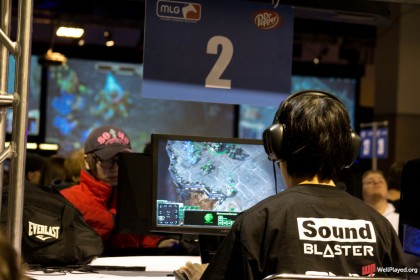The competitive professional video game movement just took a huge step in the direction of your living room. The “Major League Gaming” organization, known colloquially as “MLG,” announced in an interview with website TechCrunch early last week that it would be launching “MLG.tv,” an all-inclusive Internet-only streaming broadcast that would focus on the highlights of professional competitive gaming, in a fashion undeniably similar to ESPN and other “real sports” networks. By narrowing the gap between competition and presentation, MLG hopes to prove to the world that “e-sports” are indeed a profitable industry. But what truly defines a sport? Is it the spectacle or the audience?
On the subject of spectacle, all it really takes is a cursory observation of an MLG broadcast to see that the glamour of professional sports is second nature to the industry. MLG.tv kicked off its broadcast initiative this weekend with nonstop coverage of “MLG Columbus,” a three-day slugfest in which the highest ranked pro teams from all around the world converged in Ohio to compete in games like Dota 2 and Call of Duty: Ghosts for prize pots numbering upwards of $120,000. Thousands of people flocked to a darkened convention center, watching teams compete against each other from soundproof booths onstage, with an enormous display showing all the action dominating the background. Players wear vibrant jerseys and hoodies plastered with logos of sponsors ranging from electronics distributors seeking to capitalize on a highly specific target audience of young males, to recognizable name brands like Red Bull and Monster. Games reach a fever pitch, with analysts in suit, tie and headset providing frantic commentary and statistics like something out of SportsCenter.
All of this upheaval, however, is the result of only a few years of work on the part of MLG, which formed in 2002. The much larger audience of the general public, composed of typical consumers of more traditional sports, remains all but unaware of the fringe effort that is the e-sports movement. Dota 2 pros like Dendi and AdmiralBulldog, household names to those familiar with the game, are completely unknown outside of the e-sports community; a problem that Chris Puckett, the Don Orsillo of the professional gaming scene, believes can be easily rectified. “My goal,” Puckett said to the New York Times in early August, “is to take these guys who already have a following, enhance their production values and put them on the network … [to] bridge the hard-core gaming community to the casual viewer and still keep everyone entertained.” Puckett speaks in reference to an initiative on the part of MLG, through properties like the aforementioned MLG.tv, to bring its branding even further out into mainstream media, further blurring the line between e-sports and the ultra-popular conventional sports industry.
The line between conventional athletes and e-sports participants is a topic of significant controversy among the critics of the movement. After all, how can sitting in a chair fiddling with a keyboard and mouse compare to the physical rigors of high impact sports like football and baseball? Once again, the e-sports community effectively manipulated its influence, with “League of Legends” creators Riot Games lobbying with the U.S. government to grant “professional athlete” status to professional gamers looking to immigrate for the purpose of competition. Replicating the ability of sports like baseball to attract players from all across the world and easing the immigration process is a key way that MLG can broaden the appeal of competitive gaming in the U.S., following the example of countries like South Korea, whose Starcraft II obsession borders on the religious.
When all is said and done, however, MLG and e-sports in general have thus far managed to catch lightning in a bottle. They have, through concentrated effort over the span of a just a few incredibly short years, shifted the paradigm of professional gaming away from the quarter-wielding arcade high score junkie and toward the elite and disciplined master strategist, whose prowess is more in line with the chess grandmaster than the football lineman. Regardless of the individual merits of the game in question or the administrative body presiding over the competition, it cannot be denied that the e-sports phenomenon has already begun to snowball out of anybody’s control: MLG already has the top score.
Johnny McCabe is a Collegian columnist and can be reached at [email protected].













